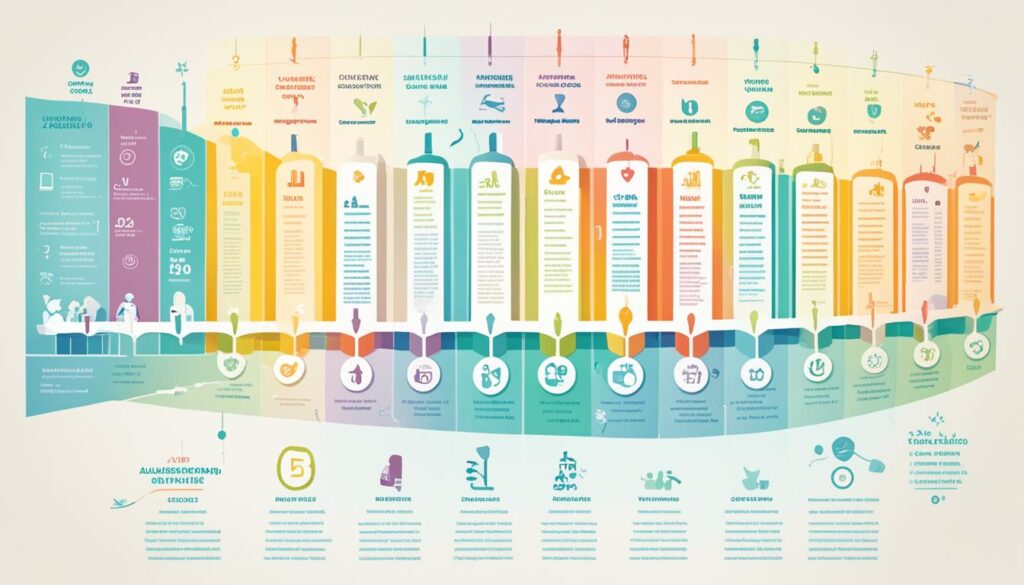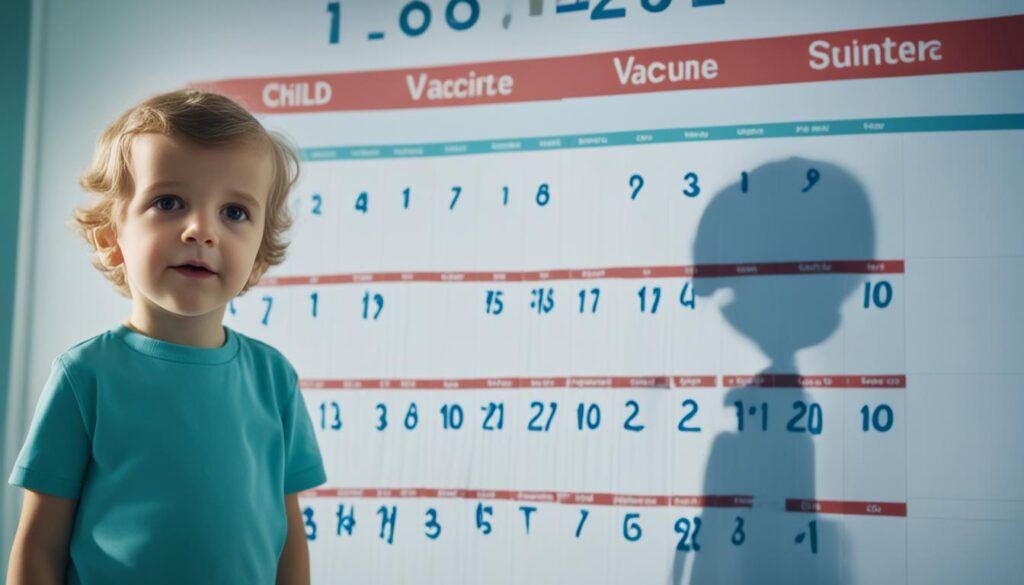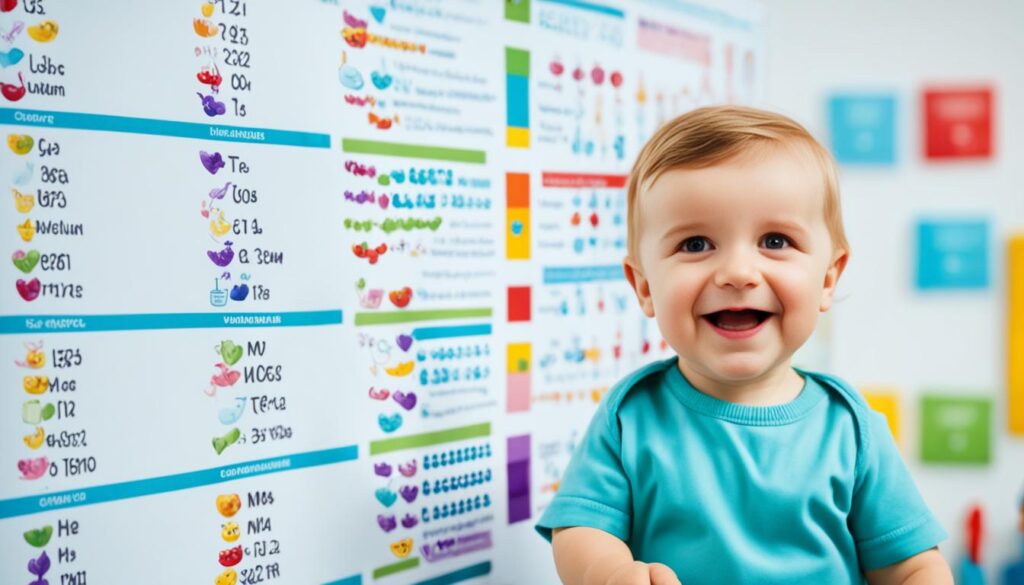
Are you fully equipped with the knowledge to protect your child’s health? Pediatric immunization plays a crucial role in safeguarding children from preventable diseases and promoting their overall well-being. With the vast array of childhood vaccines available, it’s essential to understand the ins and outs of pediatric vaccinations. This comprehensive guide will provide you with all the information you need to make informed decisions regarding your child’s immunization.
Key Takeaways:
- Immunization is vital for protecting children from preventable diseases.
- This guide will provide an overview of pediatric vaccinations and their importance.
- Understanding the pediatric immunization schedule is necessary for timely and appropriate vaccination.
- Dispelling myths and concerns about vaccine safety will help parents make informed decisions.
- Adhering to the recommended vaccine schedule and being prepared for vaccination visits is crucial.
Understanding the Basics of Pediatric Immunization
In order to truly grasp the importance of pediatric immunization, it’s essential to understand the fundamentals. This section will provide a comprehensive overview of pediatric immunization, defining its significance in safeguarding child health and exploring its historical impact on children’s well-being. Additionally, we will shed light on some common vaccine-preventable diseases that pose a risk to children.
Defining Immunization and Its Role in Child Health
Immunization is the process of stimulating the immune system to produce an immune response against specific diseases. By introducing vaccines, which are made from weakened or inactive forms of pathogens, immunization helps the body recognize and fight off these harmful microorganisms.
Pediatric immunization plays a crucial role in protecting children from a wide range of infectious diseases, including measles, polio, and influenza. It boosts their immunity and significantly reduces the risk of serious complications and hospitalizations.
Historical Impact of Vaccines on Children’s Health
Vaccines have had a profound impact on the health and well-being of children throughout history. They have successfully prevented the spread of devastating diseases and saved countless lives. Vaccines have played a pivotal role in eradicating diseases like smallpox and have drastically reduced the incidence of others, such as diphtheria and pertussis.
The implementation of widespread childhood vaccination programs has led to a significant decline in mortality and morbidity rates associated with vaccine-preventable diseases. Through timely and consistent immunization practices, we can continue protecting future generations from these harmful infections.
A Look into Vaccine-Preventable Diseases in Children
Vaccine-preventable diseases remain a threat to children’s health, despite the availability of effective immunizations. Diseases like measles, mumps, rubella, and chickenpox can cause serious complications, including pneumonia, encephalitis, and even death.
By understanding these diseases and the vaccines available to prevent them, parents and caregivers can make informed decisions about their child’s immunization. It is crucial to stay updated on the recommended vaccination schedule to ensure optimal protection against these vaccine-preventable diseases.
Children’s Vaccines: A Timeline for Pediatric Vaccinations
Birth to 6 Months: Building Initial Immunity
During the first six months of a child’s life, it is crucial to establish their initial immunity through a carefully designed vaccine schedule. By providing protection against several diseases, these vaccines safeguard the health and well-being of infants. The recommended vaccines during this period include:
- Hepatitis B
- DTaP (Diphtheria, Tetanus, and Pertussis)
- Hib (Haemophilus influenzae type b)
- PCV (Pneumococcal Conjugate Vaccine)
- Rotavirus

7 Months to 18 Months: Boosting Developing Immunities
During this phase, children’s immune systems continue to develop, requiring booster doses to enhance their protection against diseases. The recommended vaccines at this stage include:
- DTaP (Diphtheria, Tetanus, and Pertussis) booster
- Hib (Haemophilus influenzae type b) booster
- IPV (Inactivated Polio Vaccine)
- PCV (Pneumococcal Conjugate Vaccine) booster
- MMR (Measles, Mumps, and Rubella)
Before Kindergarten: Completing Early Childhood Vaccination
Before entering kindergarten, children should receive additional doses of certain vaccines to ensure complete protection. The recommended vaccines at this stage include:
- DTaP (Diphtheria, Tetanus, and Pertussis) booster
- IPV (Inactivated Polio Vaccine) booster
- MMR (Measles, Mumps, and Rubella) booster
- Varicella (Chickenpox)
- Hepatitis A
By following the child immunization schedule and adhering to the vaccine recommendations for each stage, parents can help establish a strong foundation of immunity for their children.
Vaccine Safety for Children: Dispelling Myths and Concerns
In recent years, there has been a rise in misinformation and concerns surrounding vaccine safety for children. However, it is important for parents and caregivers to understand that childhood vaccines are rigorously tested, regulated, and proven to be safe and effective in preventing serious diseases.
image alt tag: vaccine safety for children
There is a wealth of scientific research and evidence supporting the safety of childhood vaccinations. Multiple studies have been conducted to assess the potential risks and side effects associated with vaccines, and the overwhelming consensus among experts is that the benefits of immunization far outweigh any minimal risks.
It is important to address the common myths and misconceptions that often circulate about vaccine safety. Some of these myths include the belief that vaccines cause autism, contain harmful ingredients, or weaken the immune system. However, numerous scientific studies have debunked these claims, with the overwhelming consensus being that vaccines are safe for children.
“Vaccines are one of the most effective public health interventions, saving lives and preventing the spread of diseases. The safety and effectiveness of vaccines have been extensively studied and proven through rigorous scientific research.” – Dr. Emily Johnson, Pediatric Immunologist
Parents and caregivers should consult reputable sources such as the Centers for Disease Control and Prevention (CDC) and World Health Organization (WHO) to get accurate and up-to-date information about vaccine safety. It is essential to rely on evidence-based research rather than unfounded claims or anecdotal stories.
While it is normal for parents to have concerns about their child’s well-being, it is crucial to make informed decisions based on reliable information. Vaccines have been a critical public health tool in preventing the spread of infectious diseases and protecting children from potentially life-threatening illnesses.
By ensuring that children receive the recommended vaccines according to the immunization schedule, parents can protect their little ones and contribute to the overall health and well-being of their communities.
The Importance of Adhering to the Vaccine Schedule for Kids
In order to ensure optimal protection against vaccine-preventable diseases, it is crucial for parents to adhere to the recommended vaccine schedule for kids. Vaccinations play a pivotal role in safeguarding the health and well-being of children, providing them with immunity against a variety of contagious diseases.
Rationalizing the Timing and Spacing of Pediatric Vaccinations
The timing and spacing of pediatric vaccinations are carefully planned to optimize the effectiveness of each vaccine while prioritizing the safety and well-being of children. The vaccine schedule for kids is designed based on extensive research and scientific evidence to ensure that children receive the right vaccines at the right time.
The rationale behind the timing and spacing of pediatric vaccinations is multifaceted. It allows for the gradual development of a child’s immune system, ensuring that they are adequately protected at each stage of their growth and development. By spacing out vaccines, healthcare professionals can minimize potential side effects and enhance the body’s immune response to each vaccine.
Additionally, the recommended vaccine schedule for kids takes into account the natural progression of a child’s immune system. Certain vaccines are administered early in life to provide infants with a strong foundation of immunity, while others are given at specific intervals to reinforce and enhance the protection offered by previous vaccinations.
Understanding Delays and Catch-Up Vaccinations
It is important to understand that delays in following the vaccine schedule for kids can leave children vulnerable to infectious diseases. Any missed or delayed doses should be promptly addressed through catch-up vaccinations, which are designed to ensure that children receive the necessary protection even if they have fallen behind on their immunization schedule.
Catch-up vaccinations involve administering missed doses to children at an accelerated pace, bringing them up-to-date with their recommended vaccine schedule. This approach helps to bridge the gap in immunity and provides children with the protection they need against vaccine-preventable diseases.
Parents should consult with their healthcare provider to determine the appropriate catch-up vaccination schedule for their child based on their individual circumstances. By adhering to the catch-up schedule, parents can help ensure that their child is fully protected and reduce the risk of them contracting and spreading contagious diseases.

Administering Vaccines to Kids: What Parents Should Know
Administering vaccines to kids can be a daunting task for parents. However, with the right knowledge and preparation, you can make the process smoother for your child. This section will provide you with practical information and tips on how to navigate vaccination visits and address common concerns about side effects.
Preparing Your Child for Vaccination Visits
Preparing your child for vaccination visits can help alleviate anxiety and make the experience more comfortable for both of you. Here are some tips to consider:
- Explain the importance of vaccines in simple terms that your child can understand. Emphasize that vaccines protect them from getting sick.
- Use age-appropriate explanations and resources, such as children’s books, to help your child feel more comfortable and informed.
- Discuss the process and what to expect during the vaccination visit. Let them know that there might be a quick pinch or discomfort but reassure them that it will be over soon.
- Consider using distraction techniques, such as reading a book or playing a game, to redirect their attention during the vaccination.
By preparing your child beforehand, you can help them feel more at ease and navigate the vaccination visit with less stress.
Common Side Effects and How to Handle Them
It’s important to be aware of the common side effects that may occur after administering vaccines to children. While most side effects are mild and resolve on their own, knowing how to handle them can give you peace of mind. Here are some common side effects and their management:
| Common Side Effects | How to Handle Them |
|---|---|
| Fever | Give your child a fever-reducing medication, follow the recommended dosage, and ensure they stay hydrated. |
| Soreness or swelling at the injection site | Apply a clean and cool cloth to the site and encourage gentle movement of the limb to reduce discomfort. |
| Fatigue or fussiness | Allow your child to rest and provide comfort measures, such as cuddling or soothing activities. |
| Loss of appetite | Offer small, nutritious snacks throughout the day and ensure your child stays hydrated. |
It’s essential to consult your child’s healthcare provider if you have any concerns or if the side effects persist or worsen. They can provide guidance specific to your child’s needs.
By being prepared and informed, you can navigate the process of administering vaccines to your child with confidence. Remember, vaccines are crucial for protecting your child’s health and well-being, and taking the necessary steps can help make the experience more positive for both of you.
Protecting Vulnerable Populations: The Community Role
When it comes to pediatric immunization, the role of the community cannot be overstated. Communities play a vital role in protecting vulnerable populations, ensuring that every child has access to life-saving vaccines. Through community vaccination programs and initiatives, the spread of infectious diseases can be prevented, and the health of the entire community can be safeguarded.

By promoting and supporting pediatric immunization, communities can create a shield of protection around those who are most vulnerable. This includes infants, children with compromised immune systems, and individuals with limited access to healthcare. By vaccinating children, community members contribute to herd immunity, which helps prevent the spread of diseases and keeps everyone safer.
Community-based vaccination programs provide a crucial link between healthcare providers, schools, and families. These programs ensure that children receive their vaccinations on time and in a convenient and accessible manner. By organizing vaccination drives, community clinics, and outreach initiatives, communities can bridge the gap in healthcare access and deliver vital immunizations to those who might otherwise be left behind.
“It takes a village to protect the most vulnerable. When each member of a community plays their part in ensuring pediatric immunization, we create a healthier and safer environment for children to thrive.” – Dr. Samantha Roberts, Pediatric Immunologist
Furthermore, community education plays a significant role in pediatric immunization. By raising awareness about the importance of vaccines and dispelling common myths and misconceptions, communities can empower parents and caregivers to make well-informed decisions for their children’s health. This education can take the form of workshops, seminars, and informational campaigns that emphasize the benefits and safety of vaccines.
In conclusion, the community has a pivotal role in protecting vulnerable populations through pediatric immunization. Through community vaccination programs, education, and outreach initiatives, we can ensure that every child receives the life-saving vaccines they deserve. Together, we can build a healthier and safer future for all children, regardless of their circumstances.
Children’s Vaccination Clinic: Where to Get Kids Vaccinated
When it comes to getting your kids vaccinated, finding a reliable and convenient children’s vaccination clinic is essential. These specialized clinics offer pediatric vaccination services to ensure that your children receive the necessary immunizations to protect their health and well-being.
So, where can you find these clinics? Here are a few key places to consider:
- Your Pediatrician’s Office: Many pediatricians have a dedicated children’s vaccination clinic within their practice. This is a convenient option as it allows your child to receive their immunizations during regular check-ups and visits.
- Pharmacies and Drugstores: Some pharmacies and drugstores also offer pediatric vaccination services. They often have specially trained pharmacists who can administer vaccines, making it easier for parents to access these services.
- Public Health Departments: Local public health departments typically provide children’s vaccination clinics as part of their community health services. These clinics may offer free or low-cost vaccines and are a great option for families with limited resources.
- Community Health Centers: Community health centers are nonprofit organizations that provide comprehensive healthcare services, including pediatric vaccination. They serve underserved populations and prioritize accessibility and affordability.
It’s important to note that the availability of children’s vaccination clinics may vary depending on your location. To find a clinic near you, you can contact your pediatrician’s office, check the websites of local pharmacies or public health departments, or reach out to community organizations.
Remember, timely vaccination is crucial for protecting your child from vaccine-preventable diseases. By finding a reliable children’s vaccination clinic, you can ensure that your kids receive the necessary immunizations to stay healthy and safe.
Kids Vaccination Program: Support for Underserved Communities
Ensuring access to pediatric immunization is a critical aspect of promoting public health and protecting the well-being of all children. Unfortunately, underserved communities often face barriers that prevent them from accessing the necessary childhood vaccination support. To address this issue, various initiatives and programs have been implemented to improve pediatric immunization access and equity.
Addressing Accessibility and Equity in Pediatric Immunization
Efforts to address accessibility and equity in pediatric immunization aim to remove the barriers that hinder underserved communities from receiving the necessary vaccines. These initiatives focus on:
- Providing vaccination services in easily accessible locations, such as community centers, schools, and mobile clinics
- Offering extended clinic hours to accommodate working parents and caregivers
- Ensuring affordability by providing free or low-cost vaccines and eliminating financial barriers for families in need
- Expanding language and cultural support services to reach diverse populations
By addressing the challenges of accessibility and equity, these programs strive to ensure that no child is left unprotected due to limited access to vaccination services.
Collaborating with Public Health Initiatives
Public health initiatives play a crucial role in supporting children’s vaccination programs in underserved communities. Collaborations between healthcare providers, government agencies, community organizations, and advocacy groups are essential for:
- Developing targeted outreach campaigns to raise awareness about the importance of pediatric immunization
- Building trust and addressing vaccine hesitancy within underserved communities
- Providing education and resources to parents and caregivers about the benefits and safety of childhood vaccines
- Supporting vaccination clinics by supplying vaccines, trained healthcare professionals, and logistical support
By working together, these public health initiatives can strengthen the infrastructure needed to ensure widespread vaccine coverage and protect the health of all children, regardless of their socio-economic status or geographical location.

In conclusion, supporting underserved communities through targeted kids vaccination programs and collaborative public health initiatives is crucial to promoting accessibility and equity in pediatric immunization. By addressing the barriers that hinder access to childhood vaccination support, we can ensure that every child receives the vaccines they need to stay healthy and protected.
Toddler Vaccination Schedule: Navigating the Early Years
As children enter the toddler stage, it becomes crucial to follow a comprehensive vaccination schedule to protect them from potential diseases. During the ages of 1 to 3 years, there are specific recommended vaccines that will aid in safeguarding their health and well-being.
Recommended Vaccines from 1 to 3 Years
During the toddler years, there are several important vaccines that children should receive to maintain their immunity against various diseases. These vaccines include:
- MMR (Measles, Mumps, Rubella): The MMR vaccine is usually given around 12 to 15 months of age, with a second dose administered between 4 to 6 years. This vaccine offers protection against measles, mumps, and rubella, which can cause serious complications in children if left unvaccinated.
- Hib (Haemophilus influenzae type b): The Hib vaccine is typically given in multiple doses, starting at 2 months of age and completed by 15 months. It helps prevent serious infections caused by Haemophilus influenzae type b, such as meningitis and pneumonia.
- Hepatitis A: The hepatitis A vaccine is usually administered between 12 to 23 months of age, with a second dose given 6 to 18 months after the first. This vaccine protects against the hepatitis A virus, which can cause liver disease.
- Varicella (Chickenpox): The varicella vaccine is recommended between 12 to 15 months of age, with a second dose administered between 4 to 6 years. It provides immunity against the varicella-zoster virus, which causes chickenpox and potentially shingles later in life.

The Role of Booster Shots in Sustained Immunity
Booster shots play a vital role in maintaining sustained immunity for toddlers. In addition to the recommended vaccines listed above, there are also booster shots that should be administered during this period. These booster shots ensure that children’s immune systems remain strong and constantly protected against preventable diseases.
One important example is the DTaP vaccine, which stands for diphtheria, tetanus, and pertussis. It is given at 15 to 18 months, and another booster shot called Tdap is given at 4 to 6 years. These vaccines protect against these serious and potentially life-threatening diseases.
It’s essential to follow the recommended toddler vaccination schedule and ensure that all the recommended vaccines and booster shots are administered on time. This will provide the best possible protection for your child and help maintain their long-term health and well-being.
Tracking Immunization: Keeping Accurate Records for Children
Accurate documentation of childhood immunization records is paramount in ensuring the well-being of children. By tracking children’s vaccination history, healthcare providers and parents can ensure that the necessary vaccines have been administered and that future immunizations are delivered on time.
Importance of Immunization Records
Childhood immunization records serve as a comprehensive record of a child’s vaccination history. These records contain important information such as the types of vaccines received, dates of administration, and any adverse reactions or allergies. Not only do they provide healthcare professionals with crucial information, but they also enable parents to keep track of their child’s immunization status.
Immunization records play a crucial role in numerous aspects, including:
- Medical Care: Accurate records allow healthcare providers to assess a child’s vaccination status quickly and efficiently. This information is vital during routine check-ups, school health screenings, and in the event of disease outbreaks.
- Vaccine History Verification: Immunization records provide proof of past vaccinations. This is particularly important when children need to meet specific vaccine requirements for school entry or other activities.
- Vaccine Schedule Compliance: By keeping track of a child’s immunization history, parents and healthcare providers can ensure that vaccines are administered according to the recommended schedule. This adherence helps protect children from vaccine-preventable diseases.
- Monitoring Adverse Reactions: Immunization records allow healthcare professionals to monitor any adverse reactions a child may experience after vaccination. This information is crucial for future vaccine decisions and management of potential allergic reactions.
Utilizing State Immunization Information Systems
In order to ensure comprehensive and accurate immunization records, utilizing state immunization information systems (IIS) is highly recommended. State IIS are confidential, computerized databases that consolidate immunization records from various healthcare providers. These systems provide a secure and centralized location to access and manage a child’s immunization history.
With state IIS, healthcare providers, schools, and even parents can easily access updated immunization information. This eliminates the need for manual record-keeping and reduces the chances of incomplete or lost records. Additionally, state IIS can generate reminders for upcoming immunizations and identify any gaps in a child’s vaccination schedule.
By leveraging state immunization information systems, parents and healthcare providers can ensure children receive timely vaccinations and maintain up-to-date immunization records.
Vaccinations and School: Understanding Immunization Requirements for Children
When it comes to sending children to school, parents need to be aware of the immunization requirements in place to ensure the safety of all students. Immunization laws for children vary by jurisdiction, and it is essential to navigate these regulations effectively.
Navigating School Entry Vaccination Laws
School entry vaccination requirements dictate the immunizations that children must receive before starting school. These requirements are in place to protect students from vaccine-preventable diseases and maintain a healthy school environment. The specific vaccinations and timelines may differ depending on the state or country.
To ensure compliance with school entry vaccination laws, parents should familiarize themselves with the immunization schedule mandated by their local health department or school district. It is crucial to stay updated on any changes or updates to the requirements, as they may vary over time.
Parents can obtain information on school entry vaccination requirements from their child’s healthcare provider, local health department, or school administration. The necessary vaccinations are usually documented in an immunization record, which must be presented to the school during enrollment.
Pro Tip: Keeping a copy of the child’s immunization record and maintaining it up-to-date can help streamline the enrollment process and prevent any delays or issues.
Managing Exemptions and Keeping Schools Safe
While school entry vaccination laws are in place to safeguard the overall welfare of students, some exemptions may be granted based on medical, religious, or philosophical reasons. However, it is essential to balance these exemptions while maintaining the highest level of safety within the school community.
Schools follow specific protocols for managing vaccine exemptions, which may include requiring additional documentation or implementing measures to protect the unvaccinated student and the student population as a whole. These measures might involve requiring the exemption paperwork to be completed and signed by an authorized healthcare provider or implementing alternative measures to prevent the spread of vaccine-preventable diseases.
The management of vaccine exemptions focuses on keeping schools safe from outbreaks and ensuring the protection of vulnerable students who may have legitimate medical reasons for not receiving certain vaccines. Schools often work closely with local health departments to develop comprehensive policies that strike a balance between individual rights and public health.
To effectively manage vaccine exemptions, schools can educate parents about the benefits and risks of immunization, provide resources and information on the importance of vaccinations, and create an inclusive and safe environment for all students.
| State | Vaccine Exemption Policy |
|---|---|
| California | Allows medical and personal belief exemptions |
| Texas | Accepts medical and religious exemptions |
| New York | Allows medical, religious, and philosophical exemptions |
| Florida | Accepts medical and religious exemptions |
Table: Examples of Vaccine Exemption Policies in Different States
By understanding school entry vaccination requirements and effectively managing vaccine exemptions, we can ensure that our schools remain safe from vaccine-preventable diseases. It is through collective efforts and a commitment to public health that we create an environment where all students can thrive.
Conclusion
Reflecting on the Lifesaving Benefits of Childhood Vaccinations
As we near the end of this comprehensive pediatric immunization guide, it is crucial to acknowledge the lifesaving benefits of childhood vaccinations. Through the years, vaccines have played a pivotal role in preventing the spread of devastating diseases and protecting the health of our children. By vaccinating our little ones, we are not only safeguarding their well-being but also contributing to the overall health of our communities.
However, our work does not end here. The continued importance of pediatric immunization education cannot be overstated. It is essential that parents and caregivers have access to accurate and reliable information about the benefits of childhood vaccinations. By staying informed and guiding others, we can ensure that every child receives the protection they deserve.
Let us remember that the benefits of childhood vaccinations extend far beyond the individual. They contribute to the collective health and well-being of our society. By understanding the impact of pediatric immunization and educating ourselves and others, we are taking a proactive step towards a healthier future for our children. Together, let us continue to prioritize the importance of vaccinating our little ones and join hands in protecting their bright futures.
FAQ
What is pediatric immunization?
Pediatric immunization, also known as childhood immunization, refers to the administration of vaccines to protect children from vaccine-preventable diseases. It involves a series of shots given during early childhood to build immunity against various illnesses.
How do vaccines safeguard child health?
Vaccines work by stimulating the immune system to produce an immune response against specific diseases. They help children develop immunity and protect them from serious illnesses, such as measles, polio, and whooping cough, which can have severe complications and even be fatal.
What is the historical impact of vaccines on children’s health?
Vaccines have significantly reduced the incidence of childhood diseases that were once common and deadly. Diseases like smallpox and polio have been eradicated, and many others, such as measles and mumps, are now rare in vaccinated populations.
What are some common vaccine-preventable diseases in children?
Common vaccine-preventable diseases in children include measles, mumps, rubella, polio, whooping cough, chickenpox, hepatitis A and B, and pneumococcal disease. Vaccines have been developed to protect children from these illnesses.
What vaccines are recommended for children at different ages?
The vaccination schedule for children includes vaccines such as DTaP (diphtheria, tetanus, and pertussis), MMR (measles, mumps, and rubella), Hepatitis B, chickenpox, polio, flu, and meningococcal vaccines. Each vaccine has specific recommendations for when it should be administered.
Are vaccines safe for children?
Yes, vaccines are safe for children. Extensive research and rigorous testing are conducted to ensure their safety and effectiveness. Serious side effects are rare, and the benefits of vaccines far outweigh the risks of vaccine-preventable diseases.
Why is it important to adhere to the vaccine schedule for kids?
Adhering to the vaccine schedule is important to provide children with timely protection against diseases. Vaccines are given at specific ages to ensure optimal immune response and protection. Delaying or missing doses may leave children vulnerable to infections.
What happens if a child misses or delays a vaccine dose?
If a child misses or delays a vaccine dose, catch-up vaccinations can be administered. Catch-up schedules help ensure that children receive the necessary vaccines even if they missed them at the recommended age. Consult a healthcare provider for guidance on catch-up vaccinations.
How can parents prepare their child for vaccination visits?
Parents can prepare their child by explaining the importance of vaccines in simple terms and reassuring them that vaccines help keep them healthy. Offering comfort and distractions, such as a favorite toy, can also help ease anxiety during vaccination visits.
What are the common side effects of vaccines, and how can they be handled?
Common side effects of vaccines may include mild pain or redness at the injection site, low-grade fever, or mild fussiness. These side effects are temporary and typically resolve on their own. Providing comfort measures, such as cool compresses and over-the-counter pain relievers, can help alleviate any discomfort.
How do community efforts protect vulnerable populations through pediatric immunization?
Community vaccination programs play a crucial role in preventing the spread of diseases by ensuring high vaccination coverage within communities. By vaccinating a high percentage of individuals, including those who cannot receive vaccines due to medical reasons, vulnerable populations are protected through herd immunity.
Where can parents take their children to get vaccinated?
Parents can take their children to various healthcare providers, such as pediatricians, family doctors, and public health clinics, to get vaccinated. Children’s vaccination clinics are often available in communities, offering a convenient and dedicated space for immunization services.
What initiatives are available for children’s vaccination in underserved communities?
Several initiatives focus on ensuring vaccination access and support for underserved communities. These include mobile vaccination clinics, outreach programs, and collaborations with local community organizations and public health initiatives. Such efforts aim to address accessibility barriers and promote equity in pediatric immunization.
Which vaccines are recommended for toddlers from 1 to 3 years?
Toddlers from 1 to 3 years typically receive vaccines such as DTaP, MMR, varicella (chickenpox), Hepatitis A, and seasonal flu vaccines. Booster shots may also be recommended to maintain sustained immunity against certain diseases.
Why is it important to keep accurate records of children’s immunizations?
Keeping accurate records of children’s immunizations is essential for tracking vaccine history, ensuring timely vaccinations, and providing proof of vaccination when required. It helps healthcare providers monitor and manage vaccine schedules and aids in disease surveillance and outbreak control.
How can state immunization information systems help with record-keeping?
State immunization information systems (IIS) are centralized databases that collect and track immunization records. They provide a vital resource for healthcare providers and parents to access and update vaccination records, ensuring accurate documentation and continuity of care.
What are the immunization requirements for children entering school?
Immunization requirements for children entering school vary by state and country. These requirements typically include vaccines against diseases such as measles, mumps, rubella, diphtheria, tetanus, pertussis, polio, chickenpox, hepatitis B, and meningococcal disease. Parents should familiarize themselves with their local school entry vaccination laws.
How can vaccine exemptions be managed, and why is it important to keep schools safe?
Vaccine exemption management varies by jurisdiction. It is important to ensure that exemptions are granted judiciously, with careful consideration of public health risks. Keeping schools safe from vaccine-preventable diseases protects both vaccinated students and those who cannot receive vaccines due to medical reasons, fostering a healthy learning environment.